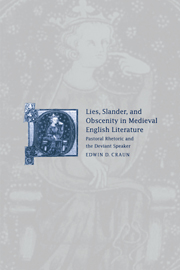 Lies, Slander and Obscenity in Medieval English Literature
Lies, Slander and Obscenity in Medieval English Literature Book contents
- Frontmatter
- Contents
- Acknowledgments
- Note on quotations and translations
- Standard abbreviations
- Introduction
- 1 The pastoral movement and deviant speech: major texts
- 2 The lies of the Fall, the tongues of Pentecost: typing and converting the deviant speaker
- 3 Exemplifying deviant speech: murmur in Patience
- 4 Confessing the deviant speaker: verbal deception in the Confessio Amantis
- 5 Reforming deviant social practices: turpiloquium/scurrilitas in the B Version of Piers Plowman
- 6 Restraining the deviant speaker: Chaucer's Manciple and Parson
- Bibliography
- Index
- CAMBRIDGE STUDIES IN MEDIEVAL LITERATURE
1 - The pastoral movement and deviant speech: major texts
Published online by Cambridge University Press: 31 October 2009
- Frontmatter
- Contents
- Acknowledgments
- Note on quotations and translations
- Standard abbreviations
- Introduction
- 1 The pastoral movement and deviant speech: major texts
- 2 The lies of the Fall, the tongues of Pentecost: typing and converting the deviant speaker
- 3 Exemplifying deviant speech: murmur in Patience
- 4 Confessing the deviant speaker: verbal deception in the Confessio Amantis
- 5 Reforming deviant social practices: turpiloquium/scurrilitas in the B Version of Piers Plowman
- 6 Restraining the deviant speaker: Chaucer's Manciple and Parson
- Bibliography
- Index
- CAMBRIDGE STUDIES IN MEDIEVAL LITERATURE
Summary
THE PASTORAL “BATTLE OF OUR LORD AGAINST THE VICES”
As literacy increased among Western Europeans in the eleventh and early twelfth centuries, so, Brian Stock argues, did scripturalism, the practice of using the written word to establish norms and values and so to control conduct. Then scripturalism was used to shape fairly small reformist communities like the Cistercians and the followers of Peter Waldo: “textual communities.” In the thirteenth century, beyond the reach of Stock's studies, the Fourth Lateran Council (1215) and its offshoots, local synods, designed a movement of pastoral care to practice scripturalism within a far larger community: the entire Western Church. Its cadre of religious teachers were parish priests and mendicants, evangelists whose orientation differed greatly from that of the inward-looking monks who had dominated the church in the preceding centuries. Its central texts were catechetical formulas like the Creed, the Seven Works of Corporeal Mercy, the Seven Sins, and, behind them all, the Christian scriptures. Its basic scripturalist activities were preaching, directing confession, and admonishing individuals. This movement also produced its own texts, pastoral writing which presented catechetical material for priests to use in the religious/social formation of themselves and the laity.
Although vast in quantity and varied in type, this pastoral literature constructs a “corporate social definition” of sin, one for all Christians to know and to use in governing their conduct.
- Type
- Chapter
- Information
- Lies, Slander and Obscenity in Medieval English LiteraturePastoral Rhetoric and the Deviant Speaker, pp. 10 - 24Publisher: Cambridge University PressPrint publication year: 1997


